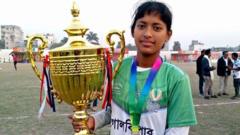Young female athletes in Bangladesh are facing increasing intimidation and threats from Islamist groups, resulting in the cancellation of football matches that symbolize women's empowerment. This situation reflects the growing influence of religious extremism amid a political transition in the country.
Islamist Extremism Disrupts Women's Football in Bangladesh

Islamist Extremism Disrupts Women's Football in Bangladesh
Multiple women's football matches in Bangladesh have been cancelled due to protests from Islamist groups, raising concerns over women's rights and safety in the nation.
In a troubling development for women's sports in Bangladesh, teenage football players have found their sporting dreams thwarted by Islamist protests. Seventeen-year-old Asha Roy, who was slated to compete in a women's football tournament in the northern Rangpur region, shared her disappointment after the event was cancelled due to opposition from the Islami Andolan Bangladesh group, which deemed the matches "un-Islamic."
The cancellation, which forced local police to act for the team's safety, marks a worrying trend as this was the third women's football match cancelled in less than two weeks in northern Bangladesh owing to similar protests. Advocates for women’s empowerment, including Asha and her teammate Musammat Tara Moni, are determined to continue playing despite the hostile environment.
The backdrop of these events is a country grappling with political changes. Following the ousting of its authoritarian government last year, concerns have risen about the re-emergence of Islamist groups previously marginalized. The protests highlight a tension within Bangladeshi society, where the national women's football team has recently gained popularity after winning two consecutive South Asia Football Championships, providing hope and inspiration for many young girls.
The responses from the interim administration affirm that they are aware of the escalating situation. Authorities have initiated investigations and attempted to reassure the public that the fears of radicalism are overstated. Nevertheless, the cancellation of sports events has spurred a backlash on social media, leading to calls for the right to publicly participate in sports without fear of violent protests or oppression.
While moderate Islam is widely practiced across the nation, incidences of extremist violence have been a reality within Bangladeshi society, with past attacks on secular figures and minority groups casting a long shadow. Critics of the current government worry that the increasing number of incidents targeting women and secular expression could lead to broader implications for rights and freedoms in society.
As female athletes like Asha Roy strive to overcome these challenges, they remind us that such struggles extend beyond the pitch. Voices advocating for women's rights emphasize that the battle against radicalism is also a quest for gender equality, and they pledge to continue fighting for the right to participate fully in public life, including playing sports.





















